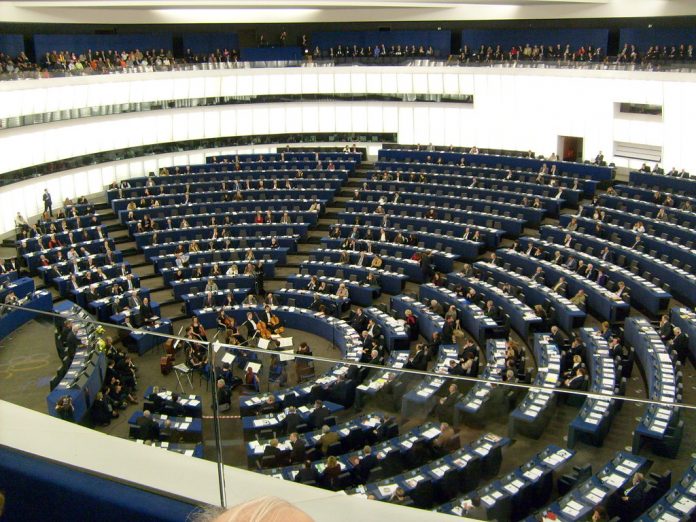On Wednesday, the European Parliament voted to approve the new European Commission of Ursula von der Leyen. Notably, with only 370 MEPs voting in favour, von der Leyen’s second Commission received the lowest degree of support any European Commission ever. That was a lot less than the 461 votes she received five years ago but also lower than 401 she managed to obtain back in July.
One of the reasons was the anger among left-leaning factions that the largest faction, the European People’s Party (EPP), had been working together with parties on the right. Despite the fact that some of these parties are in government in Belgium, Italy and the Czech Republic, where they are pursuing very mainstream policies, left-leaning MEPs continue to brand them as “far right”, a label ordinary people would reserve to Hitler-worshipping fanatics.
Of course, it was never an option for von der Leyen to fail. The political overlords of MEPs back in the capitals secured that, so a lot of the talk of MEPs torpedoing “VDL” was political theatre. The whole thing also provides yet more evidence that the European Parliament is a deeply imperfect institution, to put it mildly.
Not a watchdog
Once conceived as an institution tasked to keep the European Commission machine in check, it must be concluded that the European Parliament, despite being directly elected, has failed to become a proper watchdog over the last four decades. The key power MEPs have is to refuse discharge for EU spending.
Every year, the EU’s own auditing body, the “European Court of Auditors” (ECA), comes with a highly critical report about EU spending. In October, the body complained that there were “material and pervasive” errors in the EU’s 240 billion euro budget in 2023. Also, it expressed concern that these had increased to a whopping 5.6%, a level not seen since the financial crisis. Tony Murphy, the President of the ECA commented that “the substantial increase in the estimated level of error for the EU budget … is concerning.”
Despite this, the European Parliament has not once refused to sign off the EU’s budget. The very least one would expect would be for MEPs to refuse to sign off EU spending until the EU’s own auditor declare it “free from material error.”
Instead, MEPs always demand more EU spending. Imagine if a ceo of a company would go all out splashing his firm’s precious resources on fun, games, wining and dining, in order then to be told by his board that he should spend even more in the future. That’s basically the situation at the EU policy level, where MEPs refuse to take their core task serious in any way.
Today, MEPs approved a deal on the 2025 budget 🪙
The 2025 budget will be 6% larger than this year’s, meaning a €10 billion increase.Download extracts from the debate and the vote: https://t.co/JAHZzazvuU@negrescuvictor @jvanovertveldt @NiclasHerbst @EP_President pic.twitter.com/R26GUb3VbB
— European Parliament Audiovisual Service (@europarlAV) November 27, 2024
The European Parliament even opposes very modest proposals to improve budgetary supervision of how EU resources are being spent. For example, during the previous term, a majority of MEPs rejected the proposal to examine EU spending the year after EU funds are spent and not two years after, to strengthen scrutiny.
Also when it comes to regulation, MEPs aren’t exactly a factor reining in excessive regulation. During the previous term, a majority enthusiastically voted for the free speech-stifling “Digital Services Act”, making housing even more expensive via mandatory renovation of buildings, expanding the EU’s ETS climate tax and imposing more “due diligence” bureaucracy on companies. Moreover, they also voted for the burdensome “nature restoration law and a de facto ban of the combustion engine from 2035 on. This measure is one of the reasons for the current crisis in Europe’s auto manufacturing industry.
Somewhat longer ago, the institution has endorsed the “precautionary principle”, a hazard-based approach which some argue might previously have prevented drugs such as aspirin reaching European consumers.
For MEPs, regulations can never be severe enough, and the EU policy level can never acquire enough power. MEPs are perfectly entitled to hold such views, but clearly, it also means they can not be trusted to act as a watchdog to keep the very powerful European Commission in check.
Qatargate
Regularly, the European Parliament has also been hit by scandals, from relatively petty grabbing of taxpayers cash to large-scale corruption scandals. An example of the former is how until this day, MEPs refuse to make it mandatory to disclose how they use their monthly “expenditure allowance” of almost 5,000 euro which they receive on top of their salaries.
Another example is the European Parliament’s secretive second pension fund. This is closed for new MEPs since 2009 already, but it still has not been shut down. Former MEPs and their family members can still enjoy payouts. During the last term, a majority of MEPs voted to keep the arrangement that taxpayers should remain liable for this scheme in case it suffers investment losses.
Furthermore, there are also very serious corruption scandals that have rocked the institution. The latest is of course “Qatargate”, the major scandal that broke in 2022. European Parliament officials, lobbyists and their families would have been influenced by the governments of Qatar, and other non-European countries, engaging in corruption, money laundering, and organized crime. Greek socialist MEP Eva Kaili received most of the attention here, but Belgian media have claimed that Belgian socialist MEP Marie Arena really was the key player in this particular scandal. The investigation is still ongoing.
"One report compiled by the Belgian federal police based on intelligence gathered by the secret service describes [MEP Marie Arena] as playing “a particularly important role” in the corruption ring where she allegedly worked “closely with Panzeri on behalf of Qatar”. “Arena… https://t.co/woPLoDu2SU pic.twitter.com/WGluXSflib
— Pieter Cleppe (@pietercleppe) December 10, 2023
Separately, another scandal involving Qatar is currently being investigated by the European Public Prosecutor’s Office. According to the allegations, Henrik Hololei, a top European Commission official from Estonia, would have been indulging in long-distance air travel paid for by Qatar just when the European Union directorate he headed was negotiating with the oil-rich Gulf state.
Qatar has great financial interests in the EU. Only recently, it emerged that Russian state energy group Lukoil would be planning to sell its refinery in Bulgaria to a Qatari-British consortium, Oryx Global. One of the owners of that consortium is Qatari businessman Ghanim Bin Saad Al Saad, someone who has been named in the investigation of the decision to award the 2022 World Cup to Qatar. French newspaper Le Monde noted about this that “Brazilian and American prosecutors investigated the bank account of the former head of the Brazilian Football Federation (CBF) Ricardo Teixeira” whereby “they noticed that a payment of 22 million dollars has been made to [it] from the Qatari group Ghanim Bin Saad Al-Saad & Sons Group (CSSG).”
Also other countries, like Morocco, would however be involved in “Qatargate”. Politico has for example reported that the son of Belgian socialist MEP Marie Arena “made a trip that was paid for by a company in Casablanca”, an allegation based on transcripts from Belgium’s secret service.
Jean Quatremer, the long time EU correspondent of the left-leaning French daily Liberation, was key to highlighting the latest scandal involving Qatar. About this, he said: “Neither the European Commission nor the European Parliament wants to discuss these matters publicly. (…) From this perspective, Brussels very much resembles the Kremlin – everything is closed off, and information is withheld. When I read the report, I was completely stunned.”
None of this is exactly inspiring confidence in the EU institutions, or the European Parliament as a supposed check on the EU policy machine.













